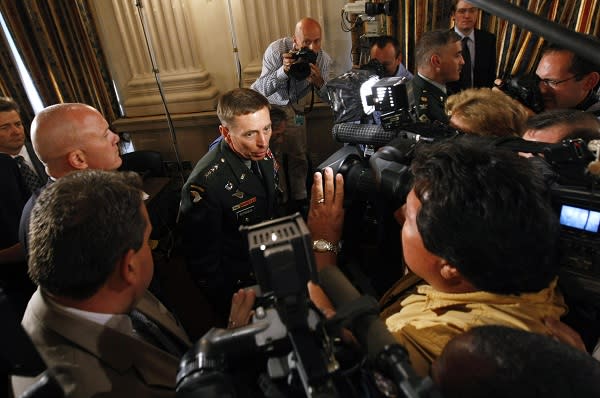 The Upshot
The UpshotCan Petraeus shift Afghanistan narrative?

Public support for U.S. involvement in Afghanistan continues dropping, according to recent polls. And yet confidence in Gen. David Petraeus, the newly installed commander of the Afghan war initiative, remains comparatively high.
Petraeus may be the best choice as commander on the ground and spokesman on the air. For that reason, the general kicks off a media campaign Sunday that will allow him to make the case for continuing the war in Afghanistan.
The August rollout of Petraeus follows a month of major PR setbacks for the military.
In July, the Pentagon had to deal with the furor over WikiLeaks publishing 75,000 classified documents online, as well as the resignation of Petraeus' predecessor, Gen. Stanley McChrystal, after a damaging Rolling Stone article.
In addition to those two debacles, daily Afghanistan coverage was increasingly grim. The U.S. military death toll rose in July to its highest level in the nine-year war, while columnists and commentators — both right and left — questioned whether the war is worth fighting.
Now Petraeus comes in to steady the ship and explain how his counterinsurgency efforts can work in the war-ravaged nation.
The general sits down Sunday with NBC's David Gregory on a special edition of "Meet the Press" from Afghanistan. There, Petraeus is expected to "discuss military strategy and the overall outlook" for the war, according to an NBC release.
Then Petraeus continues his "aggressive messaging on Afghanistan" across several other networks in the coming weeks, writes Politico's Mike Allen. The general is scheduled to appear next week on the BBC, followed by an interview with "CBS Evening News" anchor Katie Couric. Petraeus is also expected to sit down with Fox News' Jennifer Griffin and ABC's George Stephanopoulos on "Good Morning America."
But can greater exposure for a popular general help rally support behind an increasingly unpopular war?
The Pentagon surely hopes so. It's clear that Defense Department officials are keen to turn around the gathering quagmire narrative about the Afghan war.
Douglas Wilson, the assistant secretary of defense for public affairs, recently sent out a memo on how to better "manage expectations" when it comes to Afghanistan. He recommended focusing on specific milestones — rather than winning or losing — as well as jump-starting the Petraeus media charm offensive.
The Pentagon is hoping Petraeus can better control the message after the Rolling Stone debacle. In that profile, McChrystal and his aides spelled out for reporter Michael Hastings some growing divisions between the military brass and civilian leadership.
To make sure that doesn't happen again, Defense Secretary Robert Gates ordered top military and Pentagon officials to clear all interviews with the Defense Department's public relations team.

